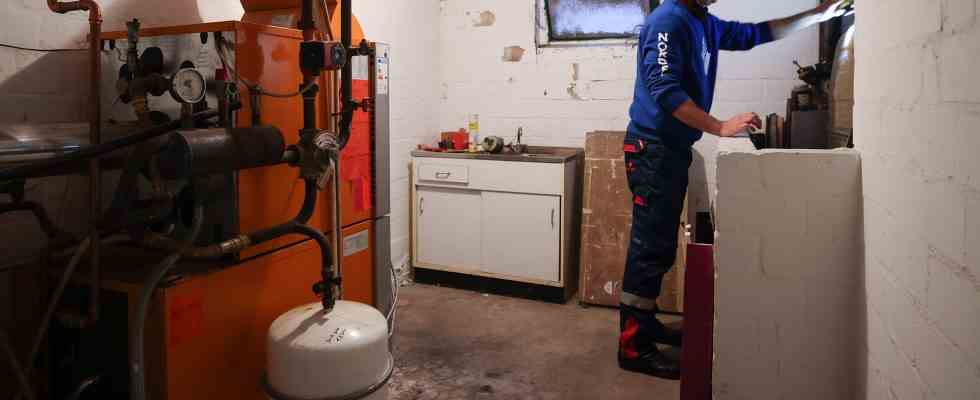As of: 03/14/2023 4:12 p.m
If the SPD and the Greens have their way, no new oil and gas heating systems may be installed after 2024. What would be the consequences for property owners?
Hermine Bolte lives in the east of Bavaria in the countryside in a small detached house. Her oil heating system, which is getting on in years, is still working, but it could break down any day. That is why she follows closely what is currently being discussed in the federal government. The planned end of oil and gas heating scares her. Because Bolte knows that she cannot afford a modern heat pump with her pension of 1,200 euros a month: “Are we on our own? Or do we get support from the government? How much, where? Is there a subsidy pot?”
Planned ban on conventional oil and gas heating
Like Bolte, millions of property owners in Germany are currently wondering what to expect if the federal government agrees to amend the Building Energy Act and several ordinances to convert the heat supply to renewable energies.
One thing is clear so far: The Federal Ministry for Economic and Climate Protection (BMWK) and the Federal Ministry for Building (BMWSB) want to ban the installation of new conventional oil and gas heating systems from January 2024. That’s what the draft says, which is currently being coordinated by the departments.
Specifically, it is required that every new heating system is operated with at least 65 percent renewable energy. Many property owners will therefore have heat pumps installed instead of oil and gas heating in the next few years. A conversion that is often associated with high costs and could overwhelm those on lower incomes in particular.
Trouble in the traffic light coalition
The housing policy spokesman for the FDP parliamentary group, Daniel Föst, remembers this in an interview with the ARD political magazine report Munich the moment he saw the coalition partner’s draft for the first time: “I actually jumped up and called through the office: ‘They can’t be serious’.”
Federal Economics Minister Habeck justifies his plan and sees the draft law as covered by the coalition agreement: “The FDP not only read it, they also signed it twice.” According to Föst, that’s not true: “What Habeck presented is far beyond what we as the FDP agreed to,” he explains. “The FDP never signed that. We won’t go along with that either.”
Specifically, the dispute within the governing coalition is about the fact that within a year “if possible […] should” have become a “duty”. The result paper of the coalition committee of March 23 of last year states: “We will now stipulate by law that from January 1, 2024, every newly installed heating system should be operated with 65 percent renewable energies should be.” In the current draft law, on the other hand, the “[…] Introduction of a requirement to use at least 65 percent renewable energy whenever new heating is installed in new or existing buildings […]” called.
Planned funding unclear
The installation of a heat pump and the refurbishment work that often accompanies it usually amounts to several 10,000 euros. Federal Economics Minister Robert Habeck therefore promised last week at the international trade fair in Munich: “It is absolutely clear that the higher costs of heat pumps for those who could not otherwise afford them must be absorbed or mitigated.”
He doesn’t say what that means in concrete terms. When asked what support pensioners who have to invest 50,000 euros in a new heating system could expect, the minister evaded: There is still no coordinated template, “and if the template has been agreed in the law, then I will also provide the specific financing before”.
The draft law only says about the promotion of low-income people: “The federal government plans to focus this promotion more on owners with low capital and low incomes in the future, in order to ensure that the obligated parties can make the necessary financial investments.” However, it is unclear where the funding will come from.
Consultations “not yet completed”
The Federal Ministry of Finance reports: The internal government consultations on the federal budget for 2024 have not yet been completed. In principle, one cannot comment on the details of the ongoing negotiations.
The president of Haus und Grund Germany, Kai Warnecke, observes that many property owners would like to make energy-saving renovations – but are unable to find the financing. The consequences of the current draft law could have serious repercussions for those with lower incomes: “They are now experiencing pure desperation. Desperation that they may no longer be able to stay in their house and have to get out of there.”
The same goes for pensioner Bolte from the Upper Palatinate in eastern Bavaria. She hopes for help from politicians. Not knowing how to finance a new heating system, she seeks help from her mayor. Marcus Gradl from the CSU is familiar with funding programs and their problems: “I would describe the whole funding jungle as madness. How are normal citizens supposed to find their way around here?” Specifically, he only has one tip for Bolte: you should look for a professional energy consultant in good time who will take care of the funding – as soon as it has been clarified. The problem: she also has to pay for the energy consultant herself.

